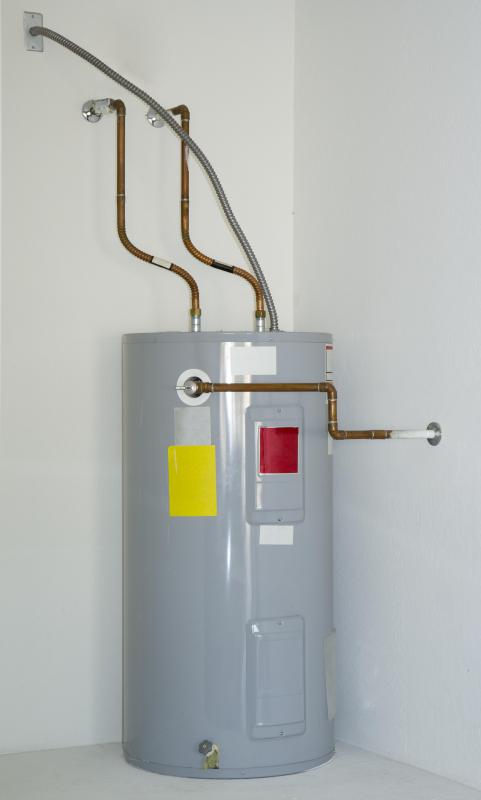At WiseGEEK, we're committed to delivering accurate, trustworthy information. Our expert-authored content is rigorously fact-checked and sourced from credible authorities. Discover how we uphold the highest standards in providing you with reliable knowledge.
How can I Improve Heating Efficiency in my Home?
It's easy to get shocked with a big energy bill during the cold winter months. There are a number of steps that can be taken to help keep those costs down to improve heating efficiency. Although some steps may require the assistance of a contractor, many others can be done easily and quickly by any do-it-yourselfer.
Your home's heating, ventilation and cooling (HVAC) system is the most obvious place to start, since this is probably the largest power draw, and the greatest source of energy loss as well. Get your HVAC systems serviced regularly and change the filters on your heating unit. A dirty filter can dramatically decrease heating efficiency, yet it only costs a few dollars and takes only a few minutes to replace.

Sealing your duct system is also an easy way to save energy. A duct system that has leaks will take in unheated air and blow it into your home. Seal the leaks with duct mastic, instead of duct tape. The attic is also a common source of drafts, so you should make sure to seal the air spaces in the attic. Holes or tunnels for plumbing or wiring, if left open, may cause cold air to move inside the walls throughout the entire house.

A hot water heater is also a major consumer of energy, and many are inefficient. A tank-style hot water heater should be wrapped if it is an unheated area of the house. Tankless, on-demand hot water heaters may improve heating efficiency, since they do not have to constantly heat a large tank of water.
Windows are another obvious source of heat loss. Ideally, windows should be positioned so as to let in the sun. Double paned windows also work very efficiently, both in winter and summer. Make sure they windows are tightly sealed, and of course, weather-stripping should always be used in the cool months to seal any open spaces that exist around windows or doors.

If you are building a new house, some design elements may also be considered, such as landscaping. Strategically placed trees may help save hundreds of dollars in heating and cooling costs. Motion detectors both outside and inside can also cut costs by automatically shutting off lights when nobody is around. In addition to motion detectors, other electronic control systems can save energy, such as programmable timers and sensors that automatically shut off other electric devices when not in use.
Strategic placement and design, routine maintenance, and a few simple do-it-yourself steps can make a big difference and save hundreds of dollars a year on energy.
AS FEATURED ON:
AS FEATURED ON:














Discussion Comments
Great article on the improvement of heating systems.
Yes, she is correct in that heating up a home takes up more energy then keeping it warm.
Heat loss via conduction is proportional to the temperature difference. In other words, the bigger the temperature difference between inside and outside the faster energy is "lost" to the outside. Even though it seems obvious that keeping the house at a lower temperature uses less energy, this is real reason why.
Letting the house get cold for a period then heating it back up to room temperature absolutely does not use more energy than keeping it at room temperature. The advantage comes from the fact that during the colder time less energy is leaking out.
There is no such thing as thermal inertia. In other words it is not any harder to heat up something because it sat cold for a while. Same energy is required to raise the temperature a degree, no matter how long it has sat at that temperature.
The exception is if your heater has an "Emergency heat" mode. The energy heat mode may use a secondary heating method which is faster responding but less efficient than the primary heating method.
It is possible that by letting the house get too cold the system will then automatically use this emergency heating method to bring the temperature back up, and due to the inefficiencies end up actually costing more.
P.S. Never let the pipes freeze. Any cost savings in heating is surely lost if this happens. Some dude Ph.D. Physics.
It is more efficient to maintain a steady temp, or to keep the daily fluctuation within a few degrees. If you have the option, use a double setback thermostat so that it automatically turns the heating system off as soon as the desired temp is reached.
Are there any other ways to increase efficiency? And does anyone know anything about geothermal heat? I am doing a project and *really* need someone to reply immediately.
E.S
I need someone to settle an argument with my Finnish partner! She claims that it is better to keep heating on constantly than to use the timer while we are at work. She claims the heating up process takes more energy than maintaining warmth. We live in Brussels so outside temp ca 10 C (48F I think!)
Is she correct? Could it be something (as in Finland) when very cold or is she mixing up with risk for damage (eg frozen pipes)?
Is it more efficient to turn the thermostat down to 60 degrees and then turn it back up in the evening or to turn the furnace off and let the temp fall below 60 degrees.
Post your comments